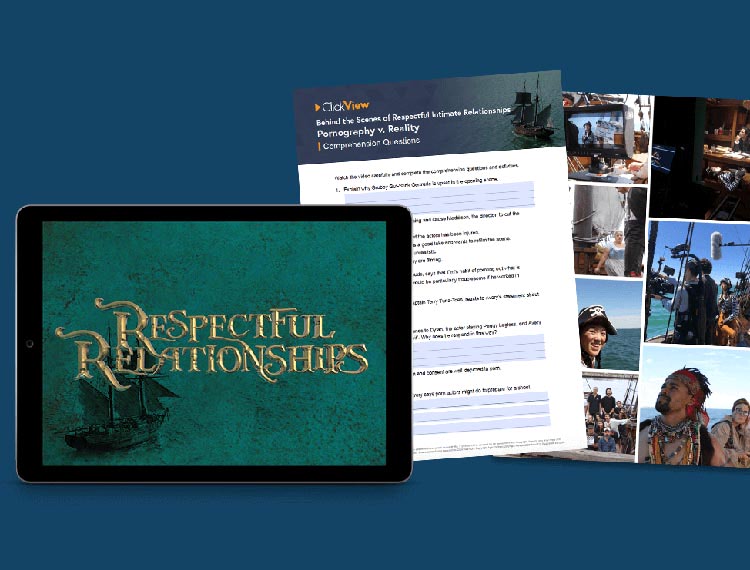New RSE Curriculum: Research reveals a lack of support from schools

As schools start to deliver the new RSE curriculum, @ClickViewUK reveals results of new research examining parents’ attitudes around relationship and sex.
New research finds 85 per cent of British parents are confident supporting their children with the facts around the realities of sexual relationships, but nearly a third don’t feel supported by schools to have conversations at home
Working alongside Relationships and Sex Consultant, Rebecca Jennings, ClickView launches its free of charge Respectful & Intimate Relationships series, championing the evolving role of video in education settings
New YouGov *research has found that 85 per cent of British parents feel confident supporting their school aged children with the facts about sex and relationships. However, less than half said that they receive support from their children’s schools (43 per cent).
Nearly one third of parents (30 per cent) said that ‘signposting to resources and services that they can use’ and ‘general support from their child/children’s school’ would be helpful to them when discussing relationships and/ or sex at home.
The research, commissioned by ClickView, comes as schools in England start to teach the Government’s new relationships and sex education (RSE) curriculum. Despite calls for a compulsory RSE curriculum in Scotland, schools continue to incorporate it within the health and wellbeing curriculum.
The NSPCC recently reported that because more young people are starting relationships online, and communicating with friends and partners through social media or video apps, the need for the RSE curriculum has never been more important, especially through the recent lockdown.
As a leading provider of video learning content to schools, ClickView has produced two new education series focused on respectful and intimate relationships. The content has been created in partnership with relationships and sex consultant, Rebecca Jennings, who has more than 18 years’ experience working with children and young people in educational settings, teaching sex and relationships education and sexual health initiatives.
Both series explore challenging and important issues surrounding respectful relationships, including sexual harassment, domestic violence, misogyny in pornography, pornography versus reality, and the sharing of intimate images. With additional resources for schools, ClickView hopes to be able to help educators further support parents.
Both series are free for both educators and parents to access.
Rebecca Jennings said, “the research findings highlight parents’ need for support in educating their children effectively. Schools need to acknowledge that parents are the primary care givers for their children and ultimately there should be a partnership between home and school as they would with every other subject in the curriculum.”
“While parents feel empowered, to navigate sensitive conversations from a very early stage with their children they are unsure of where and how to start the conversation. If we ensure a home-school partnership around the topic of RSE then we are saying to our children and young people ‘we are here’ ‘we are listening’. Education for parents around some of the topics they may not understand will certainly overcome the barriers to those much-needed discussions at home.”
British Parents attitudes on relationships and sex education: key findings:
- Mums are more confident than Dads in talking to their child about relationships and sex. 37 per cent of mums ‘very confident’ compared to just under a quarter of dads (23 per cent)
- 75 per cent of parents feel confident about talking to their children about relationships and sex
- One in five (20 per cent) parents are not confident talking to their child about relationships and sex
- A quarter of parents with children in primary school not confident (25 per cent) to talk to their child about this topic
- Parents in the south and north of England are the least confident compared to other regions (26 per cent and 23 per cent – compared to 11 per cent of parents in London who said they were not confident)
- Parents in the south of England feel the least supported (31 per cent)
- Younger parents are much less confident talking to their child about relationships and sex, 32 per cent of parents aged 25-34 not confident, compared to 15 per cent aged 45-54
- More than one third (42 per cent) of parents aged 25-34 do not feel supported by schools to talk about relationships and sex education at home
- Confidence in parents is high when it comes to supporting their children with the facts around the realities of sexual relationships, 83 per cent of British parents who responded to the survey said they were confident in doing so. Confidence is higher in older parents, 73 per cent of parents aged 25-34 compared to 92 per cent parents 45-54.
Methodology: All figures, unless otherwise stated, are from YouGov Plc. Base: 774 British parents of children aged five to 18. Fieldwork was undertaken between 8th – 10th February 2021. The survey was carried out online. The figures have been weighted and are representative of British adults (aged 18+).











Responses